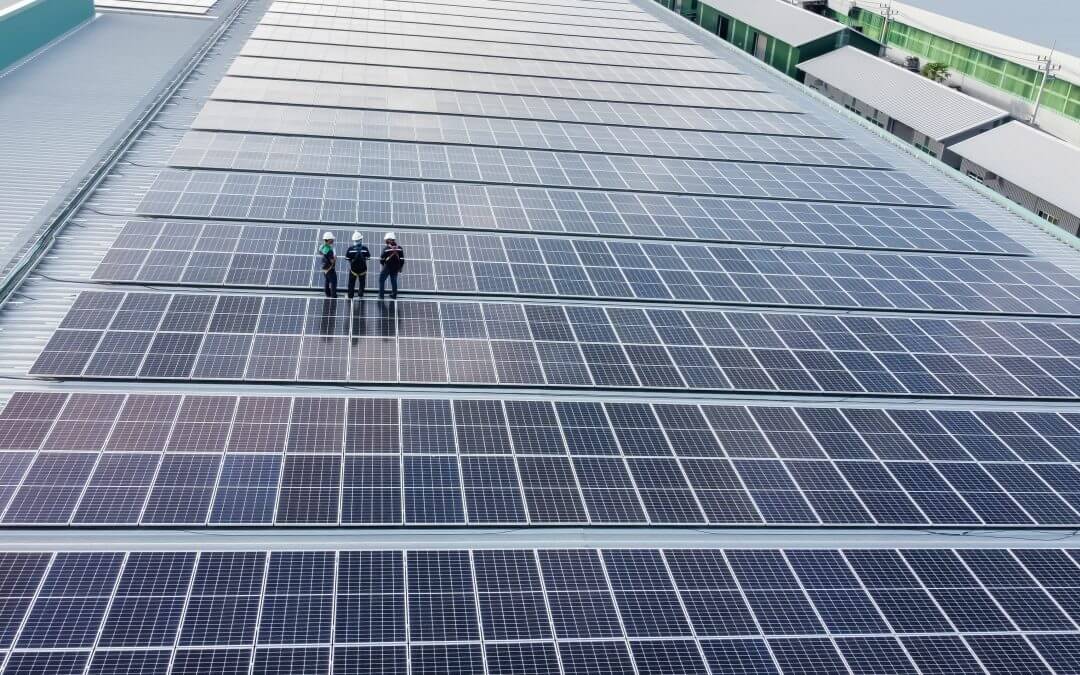Solar panels are the flat, glass-covered installations used to convert the sun’s rays into electricity to save energy. Most solar panels are made from silicon because the material is a high-quality semiconductor. Other materials such as platinum, glass, plastic, and various metals are also used for making the panels work efficiently.
When different quality materials are used, these solar panels have an average efficiency of 15% to 20%. Those made from higher quality materials can even go over 22% but are generally costly.
However, the efficiency of solar panels is not solely affected by the material they are made from. Several other factors can also determine how well these devices work. These are essential aspects to learn when planning a solar panel installation on your property.
Solar Panel Efficiency: Explained
Solar panel efficiency is measured by taking the energy output of a given surface area.
To calculate this value, you need to multiply the amount of sunlight that hits the earth’s surface in your area—or the incident radiation flux—and the size of your solar panel in square meters. Once you have this value, divide it by the maximum wattage on the panel and multiply that by 100 to get the percentage of efficiency.
Let’s say 1,000 watts per square meter of sunlight is hitting your home. With a solar panel that’s two (2) square meters, you’ll have 2,000 watts. If your panel’s advertised output is 400 watts, you’ll have an efficiency rating of 20%. To get this, divide 400 by 2,000 and you’ll get 0.2. Multiply this by 100 to get the percentage.
On average, standard testing conditions are used to measure the solar panel’s output during normal weather conditions in a particular area. However, the variables used to measure efficiency can also be affected by other factors that you would need to calculate for as well.
Different manufacturers produce solar panels differently, where the degradation rate can also vary. However, research has found that solar panel output generally falls at an average of 0.8% annually.
What are the Factors that Affect Solar Panel Efficiency?
There are several factors that could affect the efficiency rate of your solar panels. Taking note of these variables will allow you to understand better how these devices work and how they can benefit you.
- Temperature
Efficiency rates for solar panels vary with the changing temperature. Higher levels of temperatures equate to a negative impact on its overall performance. As a result, efficiency is lost the hotter it becomes.
- Climate conditions
In line with temperature, solar panels can work more efficiently during cooler temperatures as they reduce the risk of damage from heat. Colder climate conditions also allow the panel to produce more electricity.
- Energy conversion efficiency
The conversion efficiency of a solar cell is the percentage of the solar energy falling on a panel that is converted into usable electricity. This means not all sunlight that shines on a panel is converted into electricity. In fact, there are also factors that affect this, such as temperature, reflection, and wavelength.
- Shading
Shading is commonly referred to as the obstruction of radiant energy due to solid objects such as trees, roofs, and other buildings. When a solar panel does not get enough sunlight, its overall output is affected. Additionally, this can shorten the lifespan of the panel if a part of it remains under the shade.
- Sun intensity
This refers to the amount of solar energy or radiation that falls on the panel. The intensity depends on what angle and location the sun is in the sky at a given time.
- Latitude
When installing solar panels, it is vital to take into account the angle it is placed at. Depending on where the panel is facing, some angles can work better in gathering solar energy than others.
- Reflection
Solar panels often come with shiny surfaces that are designed to absorb light. However, some products reflect more light, which leads to less generated energy.
- Soiling
The term is used to describe the accumulation of dirt, snow, leaves, dust, animal droppings, and the like on the surface of solar panels. As surface soiling increases, the performance of the PV panels decreases, which leads to less energy production.
- Maintenance
Solar panels need to undergo regular maintenance to ensure that the system still produces the expected energy output. This involves regular cleaning, system checks, and occasionally replacing small parts on the panel or wiring if needed.
The company’s maintenance provider can check on the system for you as part of the purchase agreement.
- Operations
Solar panels that are regularly used at full capacity are more likely to degrade faster. Normal operations include monitoring and controlling the performance and conditions of the solar panel.
- Age
As the solar panel ages, its efficiency may decrease due to normal wear and tear. This includes problems with the battery, system operations, configuration, and installation, among others.
Conserving Energy with Better Solar Panel Efficiency
Using solar energy is one of the best ways to help protect the environment. Today, there are different types of solar panels you can install to generate electricity from the power of the sun and use it in your homes or place of business.
To make your investment more worthwhile, it is important to understand the factors affecting the solar panel system’s efficiency and performance. Contact SolarNRG today for more information about solar panel installations.

Recent Comments